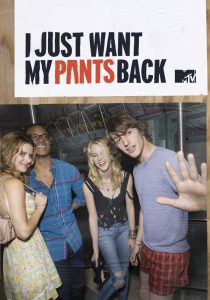I spent all of my 20s waiting for a hit show about 20-somethings. I don’t mean that I was staring at my TV, waiting for a show about 20-somethings to suddenly come on rather than going out and actually being a 20-something. I just mean that I watched a lot of good TV in my 20s, and very little of it featured characters in their 20s. I could relate to the high school shows, because I used to be in high school, and I could relate to shows about being a human being of any age, but I subconsciously longed for a show that spoke directly, specifically to me.
In retrospect, the longest-running, and probably the best, show about 20-somethings while I was in my 20s was “Angel” (1999-2004), and that’s probably why I connected with the character even though we have nothing in common. Angel was technically in his 270s, but metaphorically in his 20s. Angel was an emotionally immature drunken lout aged 26 years old when he was turned into a vampire. “Angel” used the metaphor of the title character’s age being frozen in his mid-20s to show how his maturity level didn’t change either. Then, at age 270, he meets Buffy, his heartbreaking first true experience with love. Then he goes off to Los Angeles to start his own business, make adult friends, and grow up — the perfect premise for a 20-something show.
Furthermore, the supporting players also went through their phases of switching from an unformed, unconfident youth to a better-defined adult with awareness of their strengths and weaknesses: Cordelia, Doyle, Wesley, Gunn and Fred. Still, “Angel” is never described as a show about 20-somethings, and maybe it shouldn’t be — after all, if I stretch the definition far enough, I could include “Futurama.”
Under a stricter definition, “quarterlife” (2006-07) was the best show about 20-somethings to air while I was in my 20s. It certainly wasn’t a hit, critically or ratings-wise. Creators Marshall Herskovitz and Edward Zwick, having already commercially failed with “Relativity” (a 20-somethings show from the 1990s), knew the audience for this genre was small, so they made “quarterlife” on their own dime as a web series.
On the web, “quarterlife” connected with a small but loyal following of 20-somethings as it achieved that tricky balance of having characters who were self-centered (not quite self-aware) yet ambitious about changing the world (not cynical yet). Social media was blatantly part of the show and the fan experience: The main character had a vlog that served as the framing device, and the “quarterlife” site aimed to be an artsy Facebook (I don’t blame H&Z for failing; there can only be one Facebook, as even MySpace has learned). These 20-somethings were not lovable for their character traits, necessarily, but they were kind of lovable for being real. And the cast was strong, with Bitsie Tulloch transitioning from another popular web series, “Lonelygirl15”; Scott Michael Foster stopping by on his way to stardom on “Greek,” where he essentially played the same character; and David Walton working his way up to this fall’s new series “Bent,” where he appears to be reprising his “quarterlife” character.

Then “quarterlife” did something it probably shouldn’t have: It aired an episode (six webisodes stitched together) on NBC, got record-low ratings (of course, because it was essentially a rerun), and got bashed by the media and viewers. Pretty much everyone except me utterly despises “quarterlife,” so I guess I can’t really blame networks for never launching a hit show about 20-somethings. Whether good (“Relativity” and “quarterlife”), mediocre (“The Bedford Diaries”) or bad (“Wasteland”), shows about 20-somethings — at least when they are openly, unapologetically about 20-somethings — don’t draw a big audience. Even a lot of the 20-somethings who tune in will hate it; it’s not a forgiving age bracket.
Nonetheless, MTV is taking a stab at resuscitating the genre with “I Just Want My Pants Back” (a sneak-preview of the pilot aired on Sunday, and it will return early next year). Sadly, this is far from a fresh take on the genre. “IJWMPB” takes all the excesses of a 20-something caricature, fills its cast with them, and revels in their lives. These people are depressing for simultaneously being unrealistic (incredibly cool and confident; attractive even when unattractive; witty even when flustered) and too realistic (the world of incredibly cool, confident, attractive and witty people does exist in some big-city nightclubs, but not 24 hours a day like it does on this show).
Although the 30-minute format suggests “sitcom,” the grainy, handheld camera work and serial plot suggests drama. And indeed, the drama category is the more accurate one, yet these 20-somethings inhabit the same world as those on the recent, play-it-safe sitcoms “Friends with Benefits” and “Happy Endings”; it’s just that the “IJWMPB” characters can be more explicit and vulgar because they’re on cable.
The plot involves main character Jason wanting his pants back after a girl wears them out of his apartment after a one-night stand and leaves a fake phone number. As such, well … you know the title, and it’s not false advertising. The main characters are Jason (Peter Vack) and his best-pal-who-is-perfect-for-him-but-neither-of-them-realize-it, a girl who looks like Brittany Snow breaking her wholesome image (it’s not Brittany Snow — I looked it up to be sure — it’s Elisabeth Hower). They are both obsessed with sex and marijuana. Well, not obsessed, exactly; it’s more like hooking up and drugs and partying and talking about themselves as if they are on a reality show are the sum total of their lives — you can’t be obsessed with everyday life. Some people are like this, I admit, but people like this don’t watch TV, making me wonder what type of person would enjoy this show.
My ideal TV show about 20-somethings would feature people 180 degrees removed from the characters on “IJWMPB,” or at least a handful of characters who aren’t Abercrombie-advertisement-looking a******* unaware that a world exists outside of their day-to-day life. One good thing about Jason and his friend is that they seem comfortable with who they are; they aren’t trying to affect a personality. I would be intimidated if I met them in reality; they are, in a sense, better than me — better-looking, more self-confident, more on-the-spot funny. But as TV characters, I don’t like them; I like my fictional a*******’s ignorance to be borne of stupidity, like the characters Danny McBride plays. When characters revel in their jerkiness and cleverness, it’s not endearing. And I get a sinking feeling that “IJWMPB” isn’t like Angel or the characters in “quarterlife”; I doubt we’ll see Jason get the partying out of his system then mature into a productive member of society over the course of the first season.
“IJWMPB” isn’t as bad as I’m making it sound; although the material doesn’t aim higher than a typical network sitcom, you might get a rush out of its comparative fast pace and quick wit when compared to those sitcoms. My reaction is more like this: “Finally, a new show about people in their 20s. … And this is what they settle for?” This might be the show that puts a nail in the coffin of my dream that someday someone will make a great, realistic and widely appealing show about real people in their 20s.
Maybe I should just admit defeat and queue up some “thirtysomething” on Hulu.

